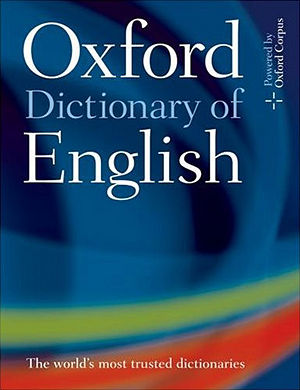Due to persistent vandalism, account creation has been suspended. If you would like an account, please contact Charlie Reams on Apterous.
Difference between revisions of "Oxford Dictionary of English"
Mclarenguy22 (talk | contribs) m |
Mclarenguy22 (talk | contribs) m (→Timeline of Editions Used in Dictionary Corner) |
||
| Line 21: | Line 21: | ||
** 3rd Edition - [[Series 64]] to [[Series 70|70]] | ** 3rd Edition - [[Series 64]] to [[Series 70|70]] | ||
* [[Oxford Dictionaries Online]] | * [[Oxford Dictionaries Online]] | ||
| − | ** Premium version and free version (Lexico) - [[Series 71]] | + | ** Premium version (Oxford Dictionaries Premium) and free version (Lexico) - [[Series 71]] |
==See also== | ==See also== | ||
Revision as of 11:29, 8 September 2021
- Oxford Dictionary of English (ODE) is separate to Oxford English Dictionary (OED) and Oxford Dictionaries Online (ODO).
The Oxford Dictionary of English (ODE) was the source dictionary used to judge words on Countdown from Series 43 to Series 70. Each updated edition typically added a number of new words, removes a few and clarifies the validity of some inflections (see letters round rules). It was replaced by use of the of Oxford Dictionaries Online (ODO) on a laptop in Series 71, which also replaced the pencam. The third and last edition remains visible on the host's desk to this day, is still in use on 8 Out of 10 Cats Does Countdown and remains part of the Countdown goody bag.
Countdown has always favoured shorter editions over the various comprehensive tomes issued by Oxford, both for reasons of television convenience and in an attempt to reward anagramming skills rather than knowledge of rare or obsolete words. Nevertheless even the concise dictionary includes a huge number of words which are likely to be unfamiliar to any one person, and some of these have become popular favourites on the show, such as TANGELO, LEOTARD and FANTOD. In the 2000s, some of the most successful players of this era, such as Conor Travers and Craig Beevers, have taken knowledge of the high-probability obscurities to new heights. Stewart Holden admits that his Grand Final win over Steve Graston hinged on his spotting the word WALDOES, which he had learnt only for its probability.
Susie Dent, the programme's longest-serving lexicographer, has frequently suggested that the words seen on Countdown contribute to decisions made about what to include in future editions. For example, after many years of being disallowed, RESOLE was finally introduced with the ODE 2nd Edition. Popular requests included MOANIEST and clouter ☓ (although these have the anagrams AMNIOTES and COULTER respectively).
Originally, the show began with the Concise Oxford Dictionary and continued to use updated editions of it until the disaster of the 10th Edition, in which many compound words were removed if their meanings were considered from their constituents. After a contestant lost a game after having ROADSIDE disallowed, it was realised that this sort of dictionary was not suitable for the letters rounds. The next series switched to the New Oxford Dictionary of English, and its updated editions were used until the end of Series 70.
Timeline of Editions Used in Dictionary Corner
- Concise Oxford Dictionary
- 7th Edition - Series 1 to 20 (Episode 1015)
- 8th Edition - Series 20 (Episode 1016) to 30
- 9th Edition - Series 31 to Championship of Champions X, and most of Series 42 (see above)
- 10th Edition - Series 42 (first six games only)
- Oxford Dictionary of English
- Oxford Dictionaries Online
- Premium version (Oxford Dictionaries Premium) and free version (Lexico) - Series 71
See also
- Oxford Dictionary of English on Wikipedia.
